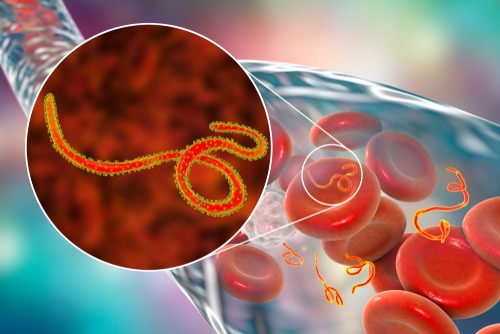
Late-stage biopharmaceutical company Soligenix, Inc. announced last week that it has created and tested a bivalent filovirus vaccine that offered 100 percent protection to non-human primate test subjects against the lethal Marburg and Ebola viruses.
“Filoviruses such as Zaire ebolavirus, Sudan ebolavirus, and Marburg marburgvirus are some of the most lethal viruses known, and they are endemic in areas of the world where the power supply and distribution network can be uncertain,” said Dr. Axel Lehrer, associate professor at the Department of Tropical Medicine, Medical Microbiology and Pharmacology, John A. Burns School of Medicine, the University of Hawai‘i at Manoa. “There are no licensed vaccines for either Sudan or Marburg viruses, while vaccines for Zaire ebolavirus are constrained by cold chain logistics. A heat stable vaccine in a single vial format would significantly enhance any public health preparedness or response to a new outbreak at its source. Our work to date has demonstrated the feasibility of rapid and efficient manufacturing, as well as the ability to thermostabilize multiple antigens that can then be stored at temperatures exceeding 100 degrees Fahrenheit.”
The vaccine candidate was formulated into a single vial, and in two separate challenges undertaken by collaboration between UHM and Soligenix, proved equal efficacy against both Marburg and Ebola. The same heat stable vaccine platform used therein was also used to develop a COVID-19 vaccine, CiVax. Previous uses of the antigens and adjuvants in this study have also been shown to protect non-human primates from subsequent infection – the only recombinant subunit vaccines to date shown to protect against these deadly viruses.
“Having a vaccine platform available such as this has the potential to accelerate worldwide vaccination campaigns addressing future health emergencies, including another global pandemic like the one we are unfortunately experiencing with COVID-19,” Lehrer said.
Collaborations between Soligenix, Lehrer, and colleagues have already shown the feasibility of creating thermally-stable subunit protein vaccine formulations for filoviruses. The effort is backed by funding from the National Institute of Health, which provided a grant to UHM, while Soligenix has also received a Small Business Innovation Research grant. Together, the partners have shown the compatibility of lyophilizing antigen and adjuvant in the same vial and reconstituting them using sterile water for injection immediately before vaccination.
“Our next generation combined vaccine platform includes three major components: a robust protein manufacturing process that has been demonstrated on multiple protein antigens, a novel nano-emulsion adjuvant which induces broad immunity, and a formulation procedure which enables thermostabilization of the combination of adjuvant and antigen in a single vial,” Dr. Oreola Donini, senior vice president and Chief Scientific Officer of Soligenix, said. “Elements of this vaccine platform have been utilized in our ricin toxin, filovirus and COVID-19 vaccine candidates, indicating its broad applicability. The ability to package more than one vaccine candidate in a single vial platform further adds to their developability, whether as a multivalent or individual monovalent vaccine, particularly against Marburg marburgvirus and Sudan ebolavirus where there are currently no available vaccines.”




